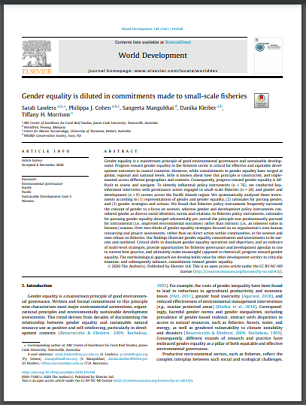
Gender equality is a mainstream principle of good environmental governance and sustainable development. Progress toward gender equality in the fisheries sector is critical for effective and equitable development outcomes in coastal countries. However, while commitments to gender equality have surged at global, regional and national levels, little is known about how this principle is constructed, and implemented across different geographies and contexts. Consequently, progress toward gender equality is difficult to assess and navigate. To identify influential policy instruments, we conducted keyinformant interviews with governance actors engaged in small-scale fisheries and gender and development sectors across the Pacific Islands region. We systematically analysed these instruments according to (1) representations of gender and gender equality, (2) rationales for pursing gender, and (3) gender strategies and actions. We found that fisheries policy instruments frequently narrowed the concept of gender to a focus on women, whereas gender and development policy instruments considered gender as diverse social identities, norms and relations. In fisheries policy instruments, rationales for pursuing gender equality diverged substantially yet, overall the principle was predominantly pursued for instrumental (i.e., improved environmental outcomes) rather than intrinsic (i.e., an inherent value in fairness) reasons. Over two-thirds of gender equality strategies focused on an organization’s own human resourcing and project assessments, rather than on direct action within communities, or for women and men reliant on fisheries. Our findings illustrate gender equality commitments and investments to be narrow and outdated. Critical shifts in dominant gender equality narratives and objectives, and an embrace of multi-level strategies, provide opportunities for fisheries governance and development agendas to rise to current best practice, and ultimately make meaningful (opposed to rhetorical) progress toward gender equality. The methodological approach we develop holds value for other development sectors to critically examine, and subsequently enhance, commitment toward gender equality.














